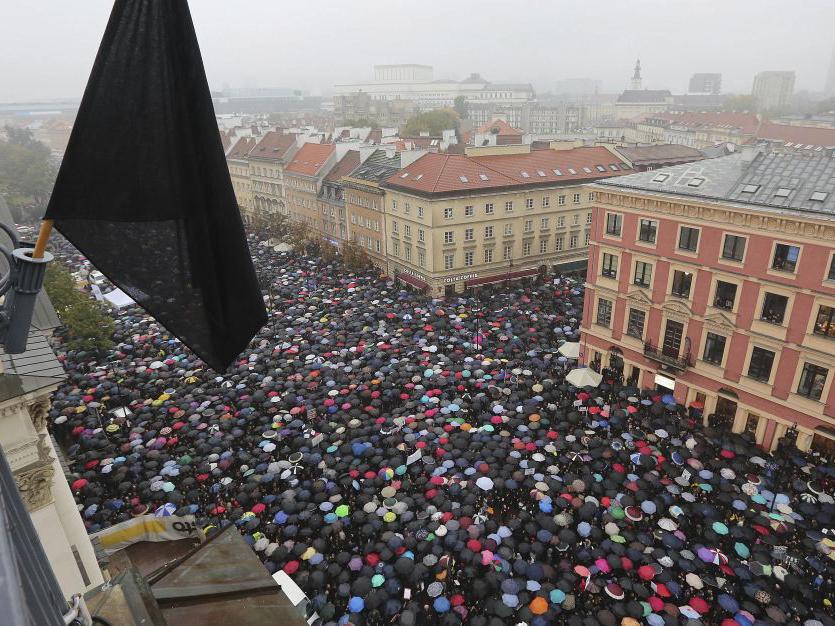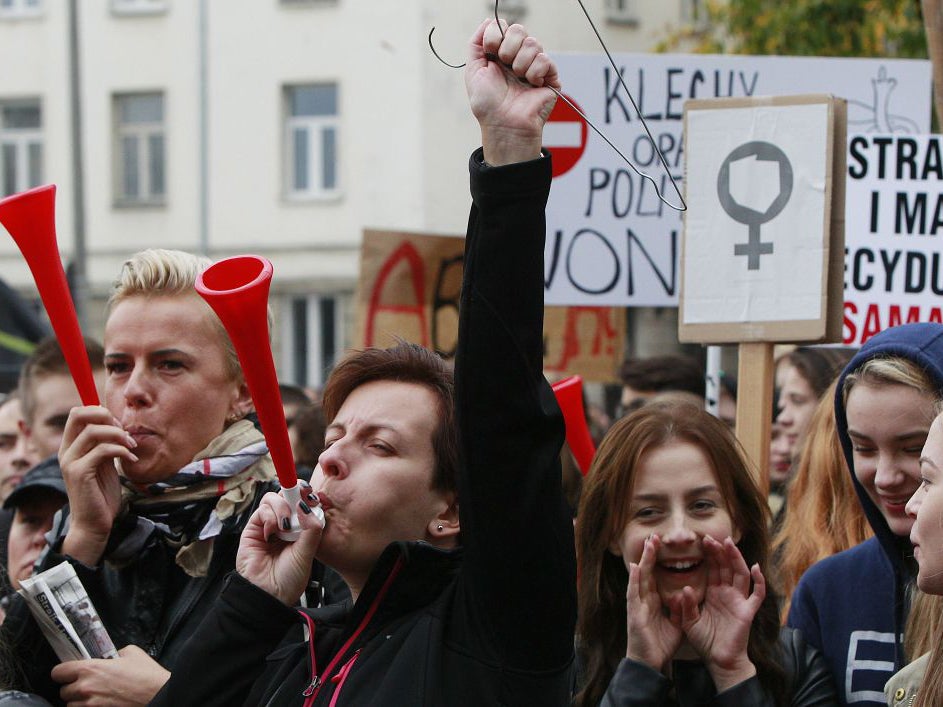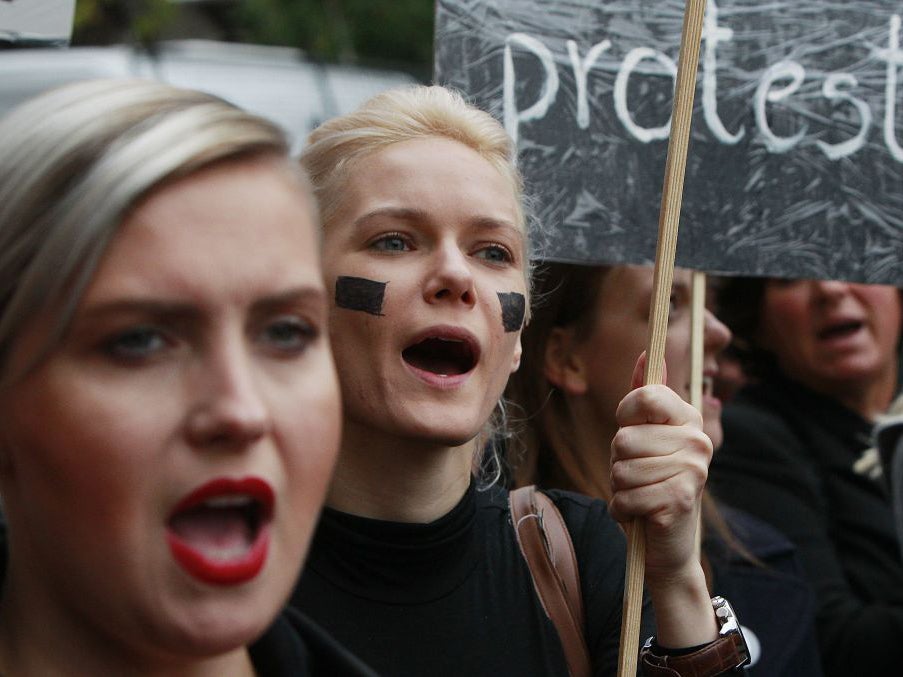Poland abortion strike: Thousands of women in over 60 cities refuse to work in protest over restrictive laws
'I am doing it for my daughter,' says one woman
Thousands of Polish women dressed in black have boycotted work and taken to the streets in protest against a plan to ban abortions.
Without half their workforce, government offices, universities and schools in 60 cities across the country closed their doors.
For the day of action, dubbed “Black Monday”, women donned dark-coloured clothes in a symbol of mourning for the loss of reproductive rights they fear.
Poland already has one of Europe's most restrictive abortion laws and opinion surveys show very little support for an even stricter law, despite the nation's deep Catholicism and conservative political direction.
Under the existing law, a hard-won compromise in force since 1993, abortion is banned except in cases where the woman's life is in danger, the fetus is irreparably damaged or the pregnancy results from rape or incest. The new proposal, now being examined by a parliamentary commission, would make all abortions illegal, even in cases of rape or when the woman's life is at risk, with prison terms of up to five years for women seeking abortion and doctors who perform them.
The proposal for the stricter law came from an anti-abortion citizens' initiative that had gathered 450,000 signatures in this nation of 38 million, and is supported by the church. The conservative ruling party, Law and Justice (PiS), which has a majority in parliament, includes supporters of the proposal but it's not clear if there are enough to push it through.
Critics say that the new rules would cast suspicion on those who suffer miscarriages. They also say doctors could be put off carrying out routine procedures on pregnant women for fear of being accused of facilitating an abortion.
One group of protesters on Monday blocked the entrance to the central government in Warsaw and chanted: “We want doctors, not missionaries!”
They held posters emblazoned with the message: “A government is not like a pregnancy – it can be terminated.”

“I didn't go to work today," Gabriela, a 41-year-old market researcher from Warsaw told Reuters.
“They are violating our civic rights, and I wanted to support all the women who may be hurt, who may be denied medical help and forced to have a disabled child. And I am doing it for my daughter.”
While it was difficult to gauge participation in small towns and rural areas, which tend to be conservative, participation in the cities appeared to be significant.
A day of protests culminated in a huge rally in the afternoon in the heart of Warsaw's historic old town, with thousands braving the rain to form a sea of figures in black packed tightly together, the only color provided by their umbrellas.
Thousands were out on the streets of Gdansk, Wroclaw and other cities – while in Brussels, some 200 black-clad protesters joined the campaign, picketing in front of the European Union offices on behalf of Polish women, with banners reading “No to the abortion ban”.
“Women must not be forced to deliver children from rape or that are unable to survive,” Brussels-based Polish writer Grazyna Plebanek told the Polish news agency PAP.
While official statistics show that several hundred legal abortions are conducted in Poland every year, activists say that too often doctors refuse because they object to it for religious or moral reasons.
Campaigners claim that tens of thousands of terminations happen in the country illegally every year, but even by conservative estimates, far more women have illegal than legal abortions. Many women must travel to Slovakia or Germany to undergo the procedure.

One protester told the BBC: “We are saying ‘enough is enough’ over what is happening, to what the government, the Church and the so-called pro-life organisations are planning for women.
“They want to introduce an anti-abortion law which will mean in many cases, women will be sentenced to death. It will take away the sense of security they have, the treatment options available when pregnancy puts their lives or health in danger.”

Yet the Foreign Minister, Witold Waszczykowski, told RMF FM: “The right to life, or as some insist, the right to an abortion, is an important moral challenge for our civilisation, our western civilisation.”
“Let them have fun,” he said of the protesting women. “They should go ahead if they think there are no bigger problems in Poland.”
Mr Waszczykowski criticised the way protesters were expressing their views, saying: “We expect serious debate on questions of life, death and birth. We do not expect happenings, dressing in costumes and creating artificial problems.”
Public support for the ruling PiS has held roughly steady at just below 40 per cent, despite criticism from the European Union and the United States that some of the government’s policies have undermined democratic checks and balances.
One poll, however, showed public backing for PiS falling to 29 per cent on Monday.
“Liberal and left-wing communities appear galvanised. One source of that is the abortion law,” Marcin Duma, head of the IBRiS pollster, told Reuters.
There were a number of counter protests across Poland with people attending special Masses in support of the new proposal. But, solidarity was also shown for the “Black Monday” protesters across the globe. Hundreds of activists marched in Berlin and protesters planned to picket the Polish embassy in London.
Kasia Staszewska, director of Amnesty International UK’s Women’s Rights programme, said in a statement: “Poland’s abortion law is already one of the most restrictive in Europe and these proposals are an all-out assault on women and girls and their right to make decisions about their own bodies.
“A woman who needs an abortion is not a criminal and decisions about her body and her health should never be placed in the hands of politicians.”
Additional reporting by agencies
Join our commenting forum
Join thought-provoking conversations, follow other Independent readers and see their replies
Comments